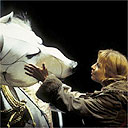
Nicholas Wright
When I adapted His Dark Materials for the National last year, the difficulty was how to convey the vast scale of the books in six hours. I didn't compress: the last thing anyone wanted was a squashed-book show. I had to cut, select and rearrange. Then came the much longer job of letting it all breathe until it felt natural and organic.
In the theatre you can suggest impossible things without spelling them out. What everyone asked was, "How will you do the daemons?" The puppeteer Michael Curry produced an army of beautiful little creatures who echo the reality of monkey, snow-goose and pine-marten, without the distraction of fur and feather. In the same way, Lyra, Will and all the other children in the show are played by actors in their 20s. They think themselves into the characters, so we believe them.
What I dreaded was losing the books' seriousness about big questions: God, loyalty, the environment, death. I remembered how much I thought about them when I was a child, and it's a basic article of faith about the show that modern children think about them just as deeply.
Tom Stoppard
I hadn't read His Dark Materials when I was asked to adapt the trilogy for the screen, but I was persuaded immediately by reading the first novel, Northern Lights. I liked it enormously. Philip doesn't "write down" to his young readers, he makes them come up to meet him. More to the point, for present purposes, his imaginative inventiveness is a gift to cinema.
I was also attracted to Philip's wide reference to everything from particle physics to Paradise Lost - too attracted in my first draft. I was asked, quite rightly, to make the script more "Lyra-centric". The job became harder the further one got into the trilogy because Philip makes time and space elastic. This doesn't trouble the reader, who may not even notice, but it is harder to deal with in a film.
I wrote a screenplay that took the story a little way into the second novel, and a treatment of what would be the second and third films. As far as I was made aware, this pleased everybody, but there was no director attached. About six months ago, the project was given to a director who likes to write his own scripts, so I haven't a clue what's going on.
Paul Hunter
I directed Told by an Idiot's version of The Firework Maker's Daughter. The story isn't as complex as His Dark Materials; in some ways that makes it more appropriate for adaptation. It's told in an economical way, but underneath this simple story is something bigger: how it feels for a parent to watch their child growing up. And it's full of things we didn't know how to do: a talking white elephant, a goddess who rises out of a lake, and a 15-minute firework competition.
We had a version of the play adapted by Steven Russell, so the challenge was to find a theatrical language for the story to work on stage. We gave ourselves a lot of restrictions - no fireworks, for a start - which meant we had to be really inventive.
There's a slight sense of responsibility doing this. For a lot of kids in the audience, this will be their favourite book, and you don't want to ruin it for them. But we love the story too, and although we've obviously had to change it, we hope we've captured its spirit.

